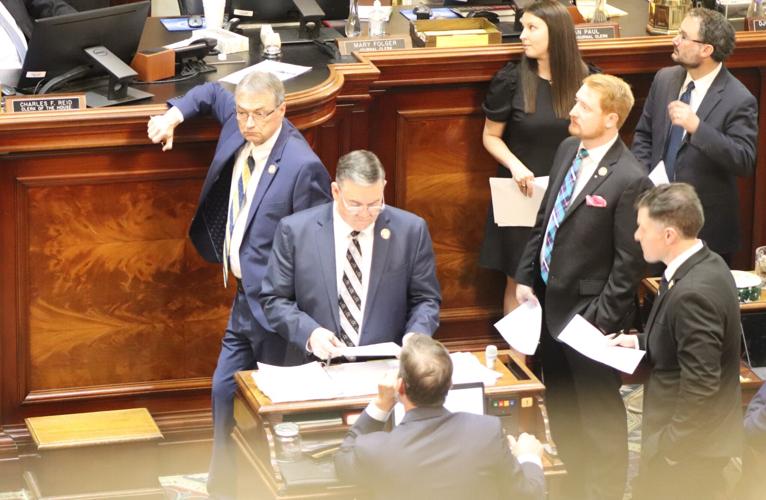COLUMBIA — A S.C. Statehouse bill widely criticized for making women who get an abortion eligible for the death penalty got a lot of attention in recent days, including in Congress, Rolling Stone magazine and newspapers nationwide.
But for all the social media chatter and spotlight put on the state's abortion foes, that bill has zero chance of becoming law.
The legislation, pre-filed in December by a newly elected far-right Republican, has never received a hearing and probably never will.
House GOP leaders said Republicans have already passed the bill they want, and even the leading abortion foe in the South Carolina House called the publicity-grabbing death-penalty proposal "outrageous."
"It doesn't represent the majority of House members or the Family Caucus or the Republican Caucus," Rep. John McCravy, R-Greenwood, told reporters March 15.
"I think it's just an extreme position," he added.
That's coming from the author of all the abortion-banning bills already pushed through the South Carolina House and fought by Democrats as extreme since the U.S. Supreme Court's ruling last June left the legality of abortions to state legislators.
The words "death penalty" don't actually appear in the abortion-ban proposal filed Dec. 15 by freshman Rep. Rob Harris, a 57-year-old registered nurse and father of 10 in Spartanburg County.
Instead, it indirectly makes women eligible for execution by extending "equal protection of the laws" to a fetus from the moment of conception, making abortion at any point of pregnancy legally akin to murder.
To be eligible for the death penalty in South Carolina, murders must have been committed with an "aggravating circumstance," which includes the killing of a child younger than 12.
Harris' bill would leave penalty decisions to prosecutors and allow the woman to use "threat of imminent death or great bodily injury" as a defense.
Harris, R-Wellford, said the national headlines are "not intellectually honest."
The intent of his bill had nothing to do with the death penalty, he said, noting a death sentence requires both prosecutors to seek it and jurors to unanimously support it.
"Does anybody honestly think that's going to happen" as a punishment for abortion, he asked.
"The bill is super simple," he said. "It doesn't change any laws on the books. It doesn't change due process. It does define life as starting at conception."
The focus on the death penalty is a "false narrative," he continued. "I'm just simply saying, does life begin at conception and if it does, should equal protection apply? My intention is to save babies."
Most of the bill's sponsors, including Harris, are members of the hardline conservative Freedom Caucus, which is publicly feuding with the larger GOP Caucus. Most Freedom Caucus members, including Harris, aren't part of the majority caucus.
Harris' bill had as many as 24 Republican co-sponsors. Nine of them removed their names over the last two weeks as the death penalty possibility made headlines.
Still, the bill became fodder for Democrats.
"It’s amazing that 16 (actually it was 15) GOP Freedom Caucus members are in support of a stronger penalty for abortion in our state than the Taliban," said state Sen. Dick Harpootlian, D-Columbia. "In Afghanistan, the penalty is seven years in prison and our Freedom Caucus wants the death penalty. Why are they trying to out-Taliban the Taliban?"
Unlike in other GOP-controlled states, South Carolina Republicans have been unable to agree on any abortion ban since the nation's high court threw out Roe v. Wade.
A 2021 law making abortions illegal at roughly six weeks briefly took effect, until the state Supreme Court suspended it last August amid a challenge tied to privacy rights in the state constitution. Justices' ruling in January threw out the law completely, leaving abortions legal in South Carolina through 5½ months, making South Carolina the second-least restrictive Southern state for abortions, behind Virginia.
That's unlikely to change anytime soon.
The House and Senate have again passed differing versions of bills outlawing abortions. And, like last fall, there seems to be no compromise between them.
Senators still don't have the votes to ban abortions prior to six weeks.
"The reality is the votes are not there" for an earlier ban, no matter what the exceptions, Senate Majority Leader Shane Massey, R-Edgefield, told reporters March 16. "We've shown that multiple times. That's just where we are."
McCravy continues to insist his chamber will accept nothing short of a ban at conception.
But he stressed major differences between what passed the House last month along party lines and the bill getting recent national headlines.
His bill's limited exceptions to a ban included abortions necessary to preserve the mother's life or lifelong health. It also allowed abortions for women up to three months pregnant who are victims of rape or incest, or for fatal fetal anomalies. And it did not criminalize women for getting an abortion.
Harris offered his bill as an amendment during the Feb. 15 floor debate. The House rejected it on a voice vote. The first article about a South Carolina proposal to make abortion punishable by death appeared a week later.
"Women are often the victims of boyfriends, victims of crimes, and we don't want to prosecute women in any way," McCravy said. "Extreme punishment would certainly be out of the question."
Asked whether House GOP leaders wanted to take up any other abortion bill amid the impasse, House Majority Leader Davey Hiott quickly gave a resounding, "No!"
As for Harris' death-penalty-possibility bill, the Pickens County Republican said, "I don't believe in that at all."











